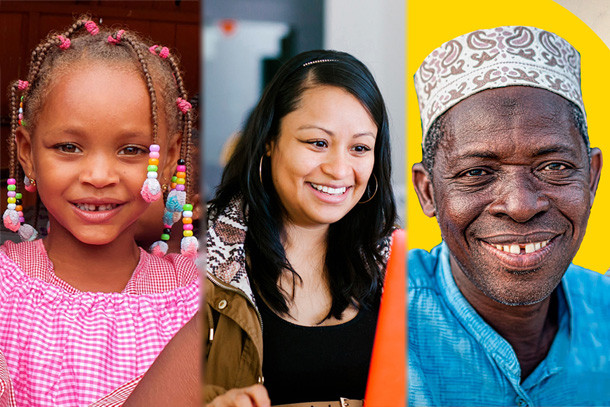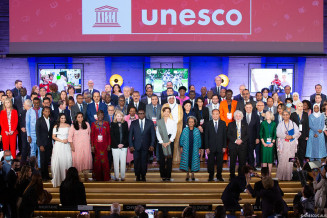Article
Driving a global movement to transform education: Key moments of 2022

2022 was a year that witnessed major milestones in the global movement to transform education. Against a backdrop of an alarming learning, and budgetary crisis, UNESCO’s call for a global mobilization to place education at the top of the political agenda resonated across the world with renewed national and global commitments. And three UNESCO World Conferences focusing on early childhood, higher education and lifelong learning further set out a common vision and pledges to drive progress in the next decade. Here are some key moments and themes that have marked this ‘transformative’ year in education.
The turning point: Why we must transform education now
Our current global education system is failing to provide quality learning for everyone throughout life and help us shape peaceful, just, and sustainable societies. UNESCO data shows that worldwide, 244 million children and youth are out of school. There is a crisis in foundational learning, literacy and numeracy skills among young learners. It is estimated that 60% of children globally are unable to read and understand a simple text by the age of ten. The COVID-19 pandemic, which triggered the largest disruption to education in history, has deepened a pre-existing crisis of inclusion, quality and relevance
It has never been more crucial to reimagine the way we learn, what we learn and how we learn, as outlined in UNESCO’s flagship Futures of Education Report, which called for a new social contract for education. The turning point is now. That is why the United Nations Secretary-General convened the Transforming Education Summit in September in New York to rally world leaders and put education at the top of the political agenda. Youth advocates were involved throughout the process leading to the Summit and adopted the Youth Declaration on their common vision for transforming education.
At the Summit, more than 130 countries committed to rebooting their education systems and accelerating action to end the learning crisis. To build momentum for the Summit , UNESCO hosted a Pre-Summit in June that was attended by 154 education ministers and vice-ministers and 1,800 participants. It provided a forum for countries to present preliminary outcomes of national consultations and to have multilateral discussions on new commitments.

Connected, inclusive and green: How UNESCO wants to transform education
UNESCO has been mobilizing and consulting all stakeholders and partners to galvanize the transformation of every aspect of learning, including an urgent call to increase education funding. An estimated US$200 billion additional education finance is required annually to get low- and lower-middle-income countries on track to achieve SDG 4.
Recent UNESCO findings reveal that around half of the 100 countries reviewed had no mention of climate change in their national curriculum. And nearly one-third of school-age children - 463 million - are without access to distance learning. That is why at the Transforming Education Summit, UNESCO put the spotlight on key initiatives to accelerate action:
- Getting every learner climate-ready: Building on the knowledge and practice accumulated in Education for Sustainable Development, a new Greening Education Partnership aims to deliver strong, coordinated and comprehensive action that will prepare every learner to acquire the knowledge, skills, values, and attitudes to tackle climate change and to promote sustainable development.
- Expanding public digital learning: A Global Initiative on Public Digital Learning will map and analyze existing public platforms and content; help countries create and strengthen national platforms; identify and share best practices; and establish international norms and standards to guide the development of platforms. The initiative aims to ensure that every learner, teacher, and family can easily access, find, and use high-quality and curriculum-aligned digital education content to advance their learning.
- Fast-tracking gender equality in education: UNESCO and partners launched a Call to Action to catalyze cooperation and transformative action on gender equality in and through education, together with a Global Platform to drive leadership and accountability.
- Improving access for crisis-affected children and youth: UNESCO together with partners presented a Commitment to Action to improve access and learning outcomes for children and youth affected by crises; to support teachers and to increase financing across humanitarian and development instruments. It stresses a holistic approach across health and social sectors.
Why early childhood care and education matters
The right to education begins at birth. But new UNESCO data shows that 1 out of 4 children aged 5 have never had any form of pre-primary education. This represents 35 million out of 137 million 5-year-old children worldwide. Despite research that proves the benefits of early childhood care and education, only half of all countries guarantee free pre-primary education around the world. UNESCO’s World Conference on Early Childhood Care and Education took place in Tashkent, Uzbekistan in November. With the adoption of the Tashkent Declaration, countries committed to invest at least 10% of total education spending on pre-primary education and to ensure that salaries and working condition of pre-school personnel are at least at par with those of primary education teachers.
Higher education: How to unleash the talent of the next generation
Higher education is evolving at a very rapid pace around the world. The number of students in universities and higher education institutions has more than doubled globally in the last two decades to 235 million. And it’s expected to double again in the next decade, along with international student mobility. With our planet’s growing sustainability challenges, large scale digitization and increasing inequalities, it’s clear that new knowledge and skills are needed today. That is why higher education must be transformed in order unleash the talent of the next generation. The UNESCO World Conference Higher Education that took place in Barcelona, Spain last May presented a roadmap that outlines key principles and transitions to reorient higher education in the decade ahead.
The right to lifelong learning: Why adult education matters
There are 771 million illiterate adults globally today and many more do not have the adequate skills and knowledge needed to navigate through our increasingly digital 21st century demands. While participation in adult education is improving in some places, access to learning opportunities remains profoundly unequal. To advance the world’s commitment to the right to lifelong learning, UNESCO convened the International Conference on Adult Education in Marrakech, Morocco in June. With the adoption of the Marrakech Framework for Action, over 140 countries committed to translating the vision of a right to lifelong learning into reality. The Framework will guide the development of adult learning and education over the coming decade.
Looking ahead
To ensure commitments are translated into concrete plans, the SDG4 High-Level Steering Committee has set up new indicators measuring green and digital education at the national level, and calls on countries to build on the Sustainable Development Goal benchmarking process by setting national targets for both. These benchmarks will measure the progress that each country intends to achieve by 2025 and 2030.
In 2023, UNESCO calls for maintaining strong political mobilization around education and chart the way to translate commitments and global initiatives into action. The International Day for Education, celebrated worldwide on 24 January, will be the year’s first event to ensure that education is at the top of governments’ agendas in a context of a global recession, growing inequalities and the climate crisis.





